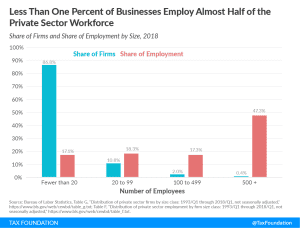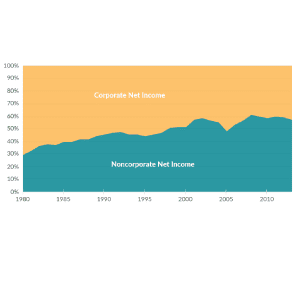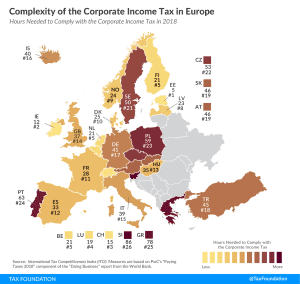
All Related Articles



2017 GDP and Employment by Industry
In the U.S. economy, there are tens of millions of businesses, including more than 30 million pass-through businesses and more than a million C corporations. Most output and employment come from firms that provide services to consumers—such as education, health care, and social assistance services—though a large share of output and employment still comes from firms in production industries, particularly manufacturing.
2 min read
New Study Finds that High Tax Rates Lower the Chance of Business Survival
America’s tax code distorts the economic decision-making of firms, such as the favorable treatment of debt financing over equity. This study adds to this argument while providing motivation for policymakers to focus on how reforms to tax policy can increase American entrepreneurship.
2 min read
Iowa Adopts a “Soft” Property Tax Cap
3 min read

Firm Variation by Employment and Taxes
Less than one percent of businesses employ almost half of the private sector workforce. Large companies pay 89% of corporate income taxes in the United States.
2 min read



Corporate and Pass-through Business Income and Returns Since 1980
More business income is reported on individual tax returns than corporate returns. The U.S. now has fewer corporations and more individually owned businesses. Corporations make up less than 5 percent of businesses but earn 60 percent of revenues.
3 min read
Sources of Government Revenue in the OECD, 2019 Update
OECD countries have on average become more reliant on consumption taxes and less reliant on individual income taxes. These policy changes matter, considering that consumption-based taxes raise revenue with less economic damage and distortionary effects than taxes on income.
10 min read
Germany Proposes First R&D Tax Break
2 min read


Tax Treaty Network of European Countries
1 min read
An Analysis of Senator Warren’s ‘Real Corporate Profits Tax’
Sen. Elizabeth Warren introduced a 7 percent surtax on corporate profits called the “Real Corporate Profits Tax.” We estimate that this tax would reduce the incentive to invest in the United States, and result in a 1.9 percent smaller economy, a 3.3 percent smaller capital stock, and 1.5 percent lower wages. The surtax would raise $872 billion between 2020 and 2029 on a conventional basis and $476 billion on a dynamic basis. The tax would make the tax code more progressive, but it would fall on taxpayers in every income group.
9 min read
An Overview of Capital Gains Taxes
Capital gains taxes create a burden on saving because they are an additional layer of taxes on a given dollar of income. The capital gains tax rate cannot be directly compared to individual income tax rates, because the additional layers of tax that apply to capital gains income must also be part of the discussion.
14 min read
